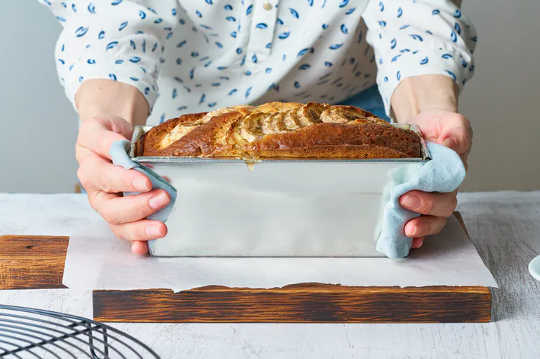During the first pandemic lockdowns at the start of 2020, social media was flooded with pictures of homemade banana bread as people turned to baking in lieu of socialising. Now with many places reintroducing or anticipating further restrictions as COVID-19 case numbers rise again, there’s a good chance we could see a revival of the home baking trend, not least because the first banana bread craze had some strong psychological roots.
Our food preferences, acceptance and consumption are shaped by family and friends, advertising, celebrity trends and, these days, social media influencers. It is sensible to be guided by others’ knowledge when mistakes carry potentially fatal consequences. This “social learning” prevents spoiled or poisonous food consumption.
Our modelling of others’ behaviour is particularly strong when following someone we admire, such as those we follow on social media. And we often turn to modelling to reduce uncertainty, which was rife during the upheaval of the first lockdown thanks to a lack of knowledge about the coronavirus.
But why banana bread? Our brains evolved when scarcity was common. Sources of sugar were subject to seasonal availability and methods for storing perishable fats were limited. Bingeing opportunistically on these biologically significant energy sources when they were available was practical.
Get The Latest By Email
The crucial nature of food to our survival makes it inherently rewarding. Even sight or smell of food triggers a response in the brain’s reward system. All foods are not equal, however, with the strongest hedonic response for the combination of sugar and fat.
We have innate preference for sweet foods, which elicit a response as potent as that triggered by cocaine. Satiety does little to diminish motivational drive for sweetness – we can be full from a large meal and still have room for dessert.
As good as the real thing
But banana bread was in our social media feed, not in front of us. Gaining as much information as we can about food before putting it in our mouth is vital to protect us from harm. We use visual and olfactory input and social influence as cues to food availability and value, increasing our motivation to eat.
This is disproportionately so for palatable foods, those tempting items packed with carbohydrates, fat and salt. Their images can trigger cravings, salivation and digestive responses.
The way we learn to associate a stimulus (banana bread) with its outcome (pleasure or satiation) means we actually receive the reward response, a burst of dopamine, in anticipation from sensory cues, rather than during consumption. In our modern environment, these cues, such as Instagram posts, might drive our food-seeking behaviour even more strongly than signals of hunger.
The act of baking might be especially potent because our olfactory cortex is highly interconnected with regions processing emotion (amygdala) and memory (hippocampal cortex). Smell can evoke vivid autobiographical memories and emotions associated with them. It can also lower heart rate, reduce stress and anxiety and improve psychological and immune function.
 Lockdown made social media stars of our home baking. Prostock-studio/Shutterstock, Author provided
Lockdown made social media stars of our home baking. Prostock-studio/Shutterstock, Author provided
Just as a madeline cake induced author Marcel Proust to relive a childhood memory in his autobiographical novel In Search of Lost Time, positive childhood memories of baking might be evoked by the scent of banana bread in the oven. This sense of comfort or happiness might be just what we needed during lockdown, especially for those apart from family.
The emotional turbulence of lockdown is also influential. Stress and low mood can trigger food cravings, especially for carbohydrates and fat-laden “comfort” foods.
Stressors increase consumption of comfort foods and increase motivational value of these foods, making us want them more. Stress increases levels of the hormone cortisol, increasing appetite and (comfort) food-seeking behaviour by reducing the effects of leptin, a hormone signalling fullness.
Sleep feeding
Lockdown also affected people’s sleep, leading to reports of vivid, bizarre dreams and increased daytime sleeping. Sleep is hugely influential on appetite and eating behaviour. Like stress, sleep deprivation is associated with palatable food cravings.
Day sleeping is particularly destructive, as it reduces melatonin secretion. We secrete melatonin when it starts to get dark, to aid sleep and increase leptin sensitivity. Lower leptin levels result in higher insulin and cortisol levels (our old friend the stress hormone), increasing hunger and food seeking.
So if you punish yourself for snacking through boredom, those extra lockdown pounds might not indicate lack of self-control. A combination of evolutionary, social, and motivational forces shape the way our brain uses sensory signals indicating food availability to control our appetite and eating behaviour.
When we are tired, stressed, or uncertain, Instagram banana bread images, signalling the heady combination of sugar and fat, might be just the cue we need to get us off the sofa and into the kitchen. Now where did I put my spatula?
About the Author
Stephanie Baines, Lecturer in Psychology, Bangor University
This article is republished from The Conversation under a Creative Commons license. Read the original article.
books_life








